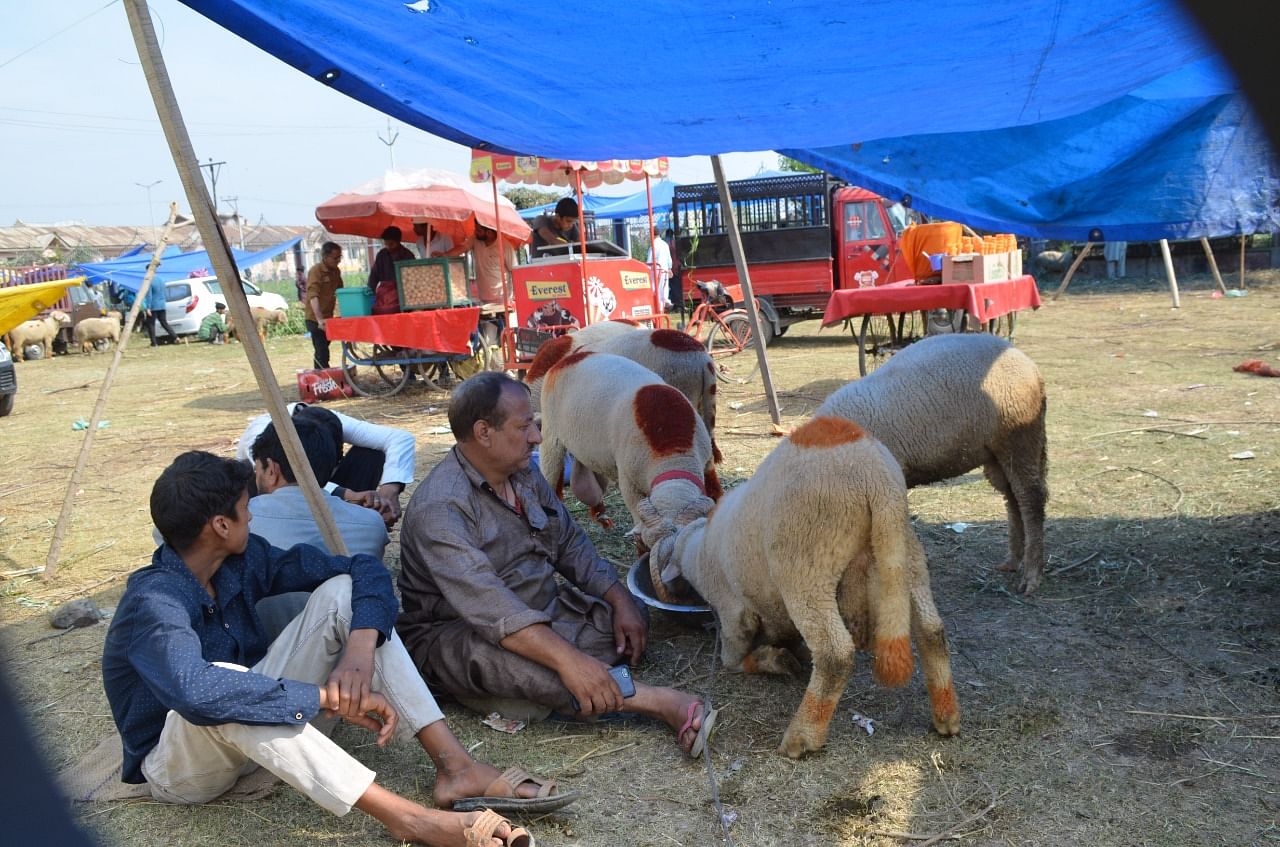Economic Struggles, Inflation & Post-Attack Anxiety Leave Traders in Distress
Srinagar | June 5, 2025 — As Eid-ul-Azha draws near, what is usually a peak season of festivity and commerce in Kashmir has turned into a period of anxiety and losses. Across markets in Srinagar, Anantnag, and Sopore, traders are reporting record-low sales of sacrificial animals, garments, and Eid delicacies, citing inflation, security fears, and declining purchasing power.
“It feels like the market is in mourning. People are more cautious, holding on to every rupee,” said Farooq Ahmed, a livestock trader at Eidgah.
Why the Eid Economy is Faltering in 2025
Inflation & Soaring Livestock Costs
-
Sheep prices have surged to ₹390–₹480 per kg, putting traditional Qurbani out of reach for many families.
-
Dealers importing livestock from Rajasthan and Gujarat (including Kajuwala, Jaisalmeri, and Marwari breeds) report poor demand, even after reducing prices by ₹50/kg.
Economic Uncertainty & Post-Attack Fear
-
The lingering effect of the April 22 Pahalgam attack, which killed 26 civilians, has created geopolitical anxiety, with buyers hesitant to spend ahead of Eid.
-
Families are prioritizing basic needs over luxury or tradition, fearing future instability.
Garment Sector Collapsing
-
Retailers in Lal Chowk, Residency Road, and Nowhatta report a 95% decline in garment sales, the worst in over a decade.
-
Unsold stock, rising rentals, and poor footfall have left many small businesses on the brink of closure.
Confectionery Industry Struggling
-
Bakeries and sweet shops, which typically thrive ahead of Eid, are facing sluggish sales.
-
“Even our Eid special walnut and honey cakes are not moving,” said a bakery owner in Dalgate.
Traders Struggle to Stay Afloat
Livestock Markets Empty
Dealers from Budgam and Ganderbal say this is the worst season in over ten years. Many have slashed prices but remain unable to recover costs.
Retailers Face Mounting Losses
-
Heavy taxation, poor liquidity, and reduced foot traffic have left many unable to pay salaries or clear debts.
-
The Kashmir Economic Alliance (KEA) warns of mass closures post-Eid if immediate relief is not granted.
Broader Economic Impact Across Kashmir
The Eid market slump is only a symptom of a deeper economic crisis sweeping across the Valley:
Tourism & Hospitality
-
The Pahalgam terror attack shattered confidence.
-
Tourist arrivals are down 60%, leading to cancellations, layoffs, and closed hotels in Gulmarg and Sonmarg.
Transport & Local Mobility
-
Taxi operators, shikara boatmen, and local guides report 70% revenue loss since April.
-
Tour packages have dropped drastically, affecting all major circuits.
Handicrafts & Small Businesses
-
Artisans in Zainakadal, Baramulla, and Pulwama are unable to sell shawls, carpets, or papier-mâché art.
-
Exports to Delhi and Mumbai have slowed, and footfall in handicraft bazaars has vanished.
Infrastructure & Development
-
Projects under PMGSY and PMDP have stalled due to funding delays and low investor confidence.
-
Labourers and contractors remain unpaid, further contributing to unrest.
Government Response: Will It Be Enough?
Relief Demands & Proposals
-
The Kashmir Chamber of Commerce and Industry (KCCI) has demanded:
-
Emergency credit lines for retailers
-
Interest subvention on loans
-
Tax waivers for six months
-
-
The KEA has also urged the government to delay loan recovery and reduce GST for Eid-related goods.
Confidence Building Measures
-
Chief Minister Omar Abdullah has launched symbolic outreach efforts in Pahalgam, including ministerial roadshows and open public darbars.
-
Tourism boards are launching campaigns targeting Gulf and Malaysian markets to restore inflow.
How Industries Are Adapting
Despite grim forecasts, Kashmir’s resilient businesses are attempting to adapt:
Going Digital
-
Artisans and retailers are shifting to e-commerce platforms like Amazon, Flipkart, and niche craft stores.
-
Some are exploring WhatsApp-based orders and deliveries for local clientele.
Small-Scale Innovation
-
Boutique owners are offering customized Eid bundles with discounts, while bakers are using social media to market home-delivered gift boxes.
Agricultural Response
-
Horticulturists are investing in drip irrigation, cold storage, and organic certifications to increase margin and export viability.
-
The government has pledged support for saffron farmers and apple growers through subsidies and market linkages.
The Bigger Picture: Can the Valley Recover?
Experts argue that unless quick financial interventions, strong security guarantees, and policy shifts are implemented, Kashmir’s economy may spiral into deeper recession.
Challenges
-
32.8% youth unemployment
-
Low credit availability
-
Security-induced travel restrictions
Opportunities
-
Reviving the tourism industry with international promotion
-
Leveraging the Vande Bharat rail link to open new trade corridors
-
Boosting IT, agro-processing, and handicraft exports
Voices from the Ground
“This Eid feels like a formality. People are praying for peace more than prosperity,” — Younis Dar, confectionery seller, Nowhatta.
“We’ve sold 40% less livestock than last year. If this continues, we’ll go bankrupt,” — Abdul Majeed, livestock dealer, Eidgah.
Final Word: Hope Amidst Hardship
As Kashmir prepares for Eid-ul-Azha under a cloud of economic strain and fear, the spirit of the people remains tested but unbroken. Whether through last-minute buyers, policy interventions, or community resilience, traders and families alike are hoping for a turnaround — if not this Eid, then soon after.



